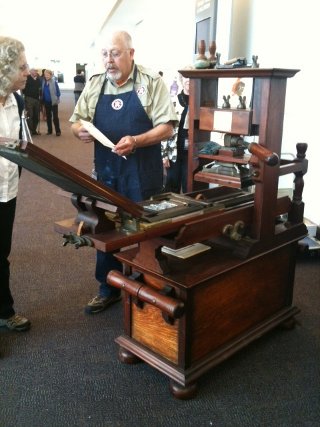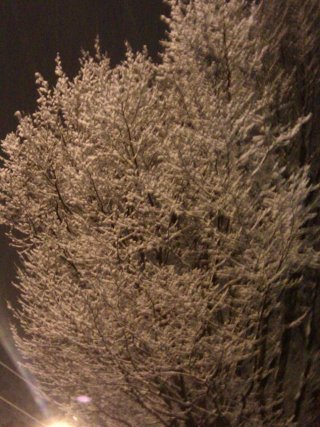The February 2014 Challenge
For the first part, simply take a photo. Just one. The subject matter is wholly up to you, but it should be an authentic snapshot — i.e. nothing posed, or set up by you beforehand. Preferably, it should be of people and/or events not connected to you personally. Submit your photo by February 8th.
You must then compose a poem to accompany each photo submitted (including your own). There are no requirements as to the poetic forms, other than that they be at least 8 lines long. As with the photos, the subject matter of the poems is up to you, except that it should be clear how the accompanying photo serves as an illustration of the poem.
The Results
Ryan Finholm’s photo
Ryan Finholm
Gutenberg: He changed the world forever
By bringing books and broadsides to the masses,
And his invention surpassed his endeavors
When literacy spread among all classes.
Immortalized in history, he shines,
Yet so few facts are known ‘bout who the man is.
Did he love music? Sports? What was his sign?
Did he tell funny jokes? Who was Johannes?
Such questions can apply to many others:
Did Homer ever like to drink alone?
Did King Tut play parcheesi with his brothers?
These people are immortal, but unknown.
Would you choose unknown glory if you could,
Like Gutenberg, who changed the world for good?
Brian Raiter
Poor printing press, you’ve been domesticated.
Though still you feel your wolfish ancestry,
The passing years have seen you enervated
By desktop printers, websites, and TV.
No longer are you set to work all night
To nip at vulpine kings, emerging scarred.
No one admires your howl in full-moon light
As much as that your finish is unmarred.
Such tasks are now reserved for new machines —
Born to a time for which they are more skilled,
A world surpassing your inventors’ means.
And yet, this world is one you helped to build.
It is a measure of the change you brought
That your own obsolescence it has wrought.
Brian Raiter’s photo
Ryan Finholm
It does not see the snow, nor feel the cold.
It does not think or sense the way we do.
It does not know that each taut branch now holds
A tier of light-packed powder. If it knew,
I wonder if the tree might want to shake,
To free itself from winter’s residue
Or if, instead, it would perhaps forsake
Unburdening its limbs for this décor
Of ermine piping made of tiny flakes.
It might not care. It’s been through worse before,
As I remember, just one year ago —
The frozen rain, the coat of ice it bore …
We’ll never empathize, but this I know:
It does not feel the cold, nor see the snow.
Brian Raiter
The wind blows hard with piercing chill
All through the day and into night,
But when it snows the air is still.
As we walk down the grassy hill,
Our argument becomes a fight.
The wind blows hard with piercing chill.
Our voices grow more loud and shrill,
Then suddenly we turn contrite.
But when it snows the air is still.
We backtrack now with fumbling skill,
But as we try to stay polite,
The wind blows hard with piercing chill.
The silence marks your lost goodwill,
Although I still insist I’m right.
But when it snows the air is still.
I wait outside for you until
The world is wholly black and white.
The wind blows hard with piercing chill,
But when it snows the air is still.


I took several pictures during the first week of February, but none of them really had a subject matter to speak of. The 8th was a Saturday, and I got caught in a surprise snowfall that evening. The buses were badly delayed, and it was after midnight by the time I made it home. So while I was riding, I selected a picture I had taken while waiting at one of the bus stops.
Unlike mine, Ryan’s photo immediately suggested a subject matter to me. I mentally chewed on it during the month, and then figured out how much of the ideas I had had could fit into 14 lines. For much of the month, I was wondering if I was going to have to turn in an unrhyming sonnet — nothing was coming together. But once I managed to get a couple of lines together, the rest began to fall into place.
I didn’t get anywhere with my own photo until I forced myself to come up with a scenario that involved people. Although I enjoy creating sonnets, I decided to do a villanelle for this one. We’ve only used it once before and I wanted to try my hand at it again.
I think this challenge really worked out well. Our entries all seem strong to me, and it’s interesting to compare the pairs for the similarities and differences.
by Brian — 28 February 2014 @ 22:02
I procrastinated and ended up taking a bunch of photos Saturday Feb 8. I went to the 47th California International Antiquarian Book Fair that day, and later that night while looking over all the photos I took (my dog, an ornate doorway, random crowd scenes, etc), the printing press seemed like the most interesting option. After a few false starts on the poem, I took a closer look at the Wikipedia page on Johannes Gutenberg. I was a little frustrated to see how little information was available about him… so that lack of information became the poem. BTW the “was” in line 8 should be italicized.
The sonnet for Brian’s photo is the one that I wrote first. The poem came pretty easily, but I kept going back several times to change individual words prior to submitting it. The poem is, of course, a Breadbox sonnet (with that terza rima rhyme scheme).
I like Brian’s poems a lot, in particular his villanelle. I’m not a big fan of villanelles but Brian has a great touch with them, perhaps because he seems to prefer imposing extra limitations on his own rhyme schemes – to great effect.
by RyanF — 28 February 2014 @ 22:42
> BTW the “was” in line 8 should be italicized.
Thanks for the note. Fixed.
by CC — 28 February 2014 @ 23:29